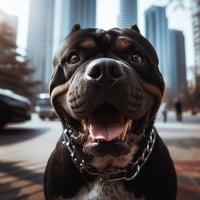Puppies go through developmental stages called "fear periods," where they may become startled or...
Source of Aggression and Reactivity in Dogs
Aggression and reactivity in dogs are often misunderstood. These behaviors are not signs of a "bad dog" but rather signals of fear, frustration, or unmet needs. Understanding the root cause can help owners address the problem effectively.
The Roots of Aggression and Reactivity
-
Fear and Insecurity:
Many dogs react aggressively because they feel threatened or scared. Loud noises, unfamiliar environments, or poorly managed socialization during puppyhood can lead to fear-based aggression. -
Frustration and Barrier Reactivity:
Dogs that are on a leash, behind a fence, or unable to engage with a stimulus may exhibit frustration-based reactivity, barking or lunging to release their pent-up emotions. -
Resource Guarding:
Aggression can arise when dogs feel the need to protect valuable resources, like food, toys, or even their favorite person. This stems from an instinct to ensure survival. -
Genetics and Breed Traits:
Some breeds are predisposed to protective or reactive behaviors due to their working heritage. For example, herding breeds may bark or lunge to control their environment.
What Can You Do?
- Identify Triggers: Keep a log of situations where your dog shows aggression or reactivity. This can help you understand what sets them off.
- Implement Positive Reinforcement: Reward calm behavior to replace reactive tendencies with desirable actions.
- Work with a Professional: If aggression is severe, consult a trainer or behaviorist who specializes in force-free methods.

Interested in getting help with socialization or public access training for your urban pup? Check us out at https://socialdogsllc.com!
.png?width=50&height=50&name=Profile%20round%20logo%20(1).png)



